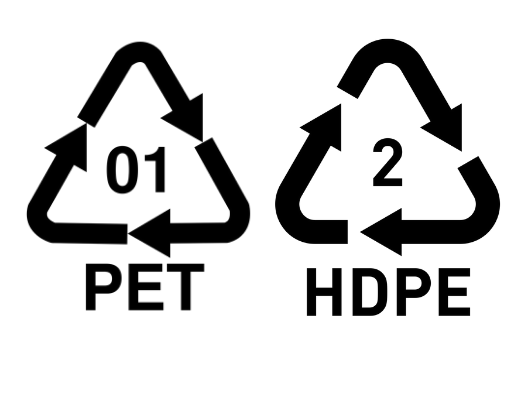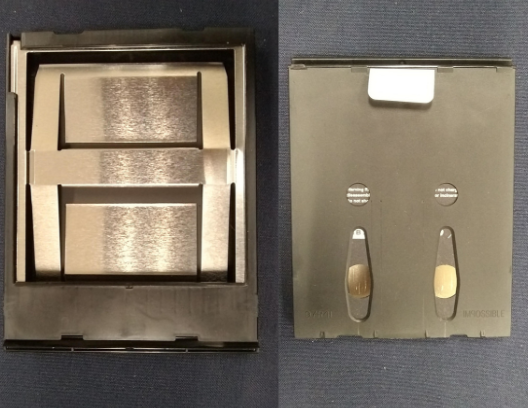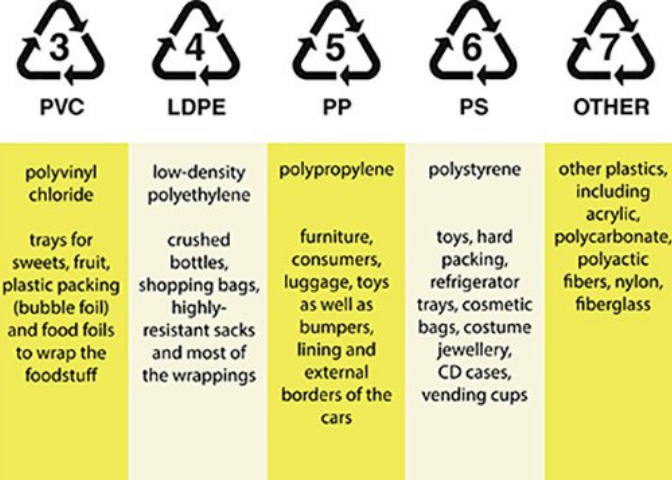How to Recycle on Campus
We must work together to ensure that the university community is able to recycle efficiently and effectively. To do this, it is important to become familiar with items that can and cannot be recycled in our area. Click the topics below to learn what we can recycle, what not to recycle, and some helpful hints.
What to Recycle
Recycling in the City of Oxford is specific to the recycling centers available at the local and state levels. Below are two sections detailing the items that can be recycled in Oxford and the items that cannot be recycled in this area. Check out the items listed and important details about each item to become informed about recycling on campus and in Oxford.
There are four main types of recyclables that can be collected on campus and in the city through the standard recycling program:
- Aluminum & steel cans
- Mixed paper/cardboard
- Plastic
- Electronic waste (e-waste)
Important note for storage and collection of recyclables:
- Do not bag your recyclables. Place recyclables loosely into the bins to increase efficiency of the recycling process. If you use a bag to collect your recyclables throughout the week, pour the items out and reuse the bag if possible. Placing bagged recyclables into receptacles slows down the entire recycling process because the bags must be opened by hand before the recyclables are sorted. Bags can also damage machinery at the Oxford Recycling Center.
- When in doubt, leave it out. It may seem counter-intuitive, but if you do not know if an item is recyclable, leave it out of your bin. High contamination rates (too many non-recyclables placed in your bin) can make the entire bin of items non-recyclable, especially when food or liquid is involved. The expression “one bad apple could spoil the bunch” pretty much sums up the situation. This is one of the reasons it is so important to know what is recyclable in your area.
Aluminum & Steel Cans
Aluminum cans can be recycled over and over again, forever. In general, a recycled can will be back on grocery store shelves in as few as 60 days.
Recycle empty and clean:

All steel and aluminum cans are recyclable in the Oxford area. This includes beverage cans and food cans.
-
-
- Soda/beverage cans
- Food cans
- Shaving cream cans
- Aerosol cans
- Pet food cans
-
Important details when recycling aluminum cans:
-
-
- Empty and rinse cans, especially if they have food residue in them.
- Do not bag cans. Store cans loosely in a recycling bin (no plastic or paper bags)
- You can leave the labels on.
-
Paper and Cardboard
Recycle:

Various newspaper, paper, paperboard, and cardboard items.
-
-
- Newspapers
- Clean, dry, non-bound newspaper only. You can recycle inserts that come in newspapers too.
- Mixed Paper
- Magazines and catalogs
- Softback textbooks (less than 1/2 inch thick with glue binding)
- Phone books
- Paper bags
- Junk mail and envelopes (even with the plastic window)
- Manila folders
- Non-corrugated boxes (cereal boxes, granola bar boxes, etc.)
- Cardboard
- Small to large cardboard boxes, flattened (you can leave tape attached)
- Tops of pizza boxes uncontaminated by food, grease, or oil
- Newspapers
-
Important details when recycling paper and cardboard:
-
-
- Put all paper loosely into a recycling bin. Do not use plastic bags to collect paper, as they hold up the sorting process and increase the risk of damaging the conveyor belt at the Oxford Recycling Center.
- Use the mixed paper bin at drop-off locations for all types of paper (except newspaper) including non-corrugated materials like cereal and granola bar boxes. Newsprint paper must be collected in a separate recycling bin.
- For curbside recycling, collect all paper (mixed and newsprint) in one bin.
- Break down cardboard to save space in the recycling truck and bin. A box that has not been flattened takes space away from others.
- If non-corrugated and cardboard boxes are contaminated with food, grease, or oil, do not recycle. Cut off the portion of box with contamination if possible.
- Paper products that are soiled by food and food-related products cannot be recycled because the paper fibers will not be able to be separated from the oils during the pulping process.
- Wet paper and cardboard can still be recycled.
-
Plastics
The plastics industry uses a coding system to help consumers identify different types of plastic resins used in packaging. Check the bottom of most plastic containers to find these codes. Of the many types of plastics used in packaging, two types of plastic are recycled on the University of Mississippi campus and in the City of Oxford: #1 plastics (PET) and #2 plastics (HDPE). Look for the symbols below on the bottom of the plastic item.
Recycle empty and clean:
-
-
- #1 Plastics (PET) examples:

Plastics 1 and 2 resin codes.
- Soda bottles
- Water bottles
- Salad dressing containers
- Mouthwash bottles
- Peanut butter containers
- #1 Plastics (PET) examples:
-
-
-
- #2 Plastics (HDPE) examples:
- Milk jugs
- Detergent bottles
- Cereal box liners
- Motor oil bottles
- Butter tubs
- #2 Plastics (HDPE) examples:
-
Be sure to check the number on some food and liquid containers if you are not sure whether to recycle the item or not.

Various plastics 1 and 2 items.
Important details when recycling plastics:
-
-
- There is no need to separate aluminum from plastic on campus or in Oxford. Aluminum cans and plastics are collected together everywhere on campus, regardless of what the label on the bin may indicate (such as “plastic bottles only”). These materials will be separated at the Oxford Recycling Center.
- You can leave the lid on. It’s not necessary to remove the top of your plastic bottle before recycling.
- Empty the container before placing the plastic item into the recycling bin.
- Put all plastic loosely into the bin (no paper or plastic bags).
- You can crush plastic bottles to save space in the collection bin.
- There is no need to separate aluminum from plastic on campus or in Oxford. Aluminum cans and plastics are collected together everywhere on campus, regardless of what the label on the bin may indicate (such as “plastic bottles only”). These materials will be separated at the Oxford Recycling Center.
-
Electronic Waste (e-waste)
Printer cartridges, like ink and toner, are made up of a complex combination of plastics, metals, foam, ink and toner. Throwing them into landfill wastes resources and contributes to the growing problem of electronic waste. By recycling your cartridges you are helping to reduce this waste. Read more about where to take used cartridges here.
Recycle:

A type of ink cartridge.
-
-
- Toner cartridges
- Ink cartridges
-
Important details when recycling e-waste:
-
-
- The waste toner container collects toner that does not transfer to paper. It remains on the drum surface after printing. When removing the toner, ensure that you do not touch the drum surface of the cartridge.
- Avoid exposing the cartridge to extreme temperatures.
- Never dispose of your empty toner along with regular trash or by burning.
-
What Not to Recycle
It is important to know what items cannot be recycled in our area. Certain materials are not recyclable simply because of the contents they are made from. Others are not recyclable because they are a mix of materials that cannot be separated during the recycling process.

Non-recyclable milk cartons.
-
-
-
- Cardboard juice and milk cartons
- These cartons are difficult to recycle because of the separation process. The cartons are lined with low density polyethylene (#4 plastic, LDPE) to help insulate the liquid inside. In the case of drink boxes, there is a lining of aluminum foil. Due to the difficulty of separating the materials, Oxford does not recycle them since the boxes cannot be mixed with paper or cardboard.
- Aluminum foil and aluminum serving trays
- Aluminum can leach into food items and into the environment. Aluminum products covered or contaminated with food, grease, and oil are rendered non-recyclable.
- Consider using alternatives to aluminum foil for food storage like glass, ceramic, and stainless steel. Reusable dishes with lids or covered with Bees Wrap is another option to store food.
- Plastic straws & cutlery
- Plastic straws are made out of #5 plastic, also known as polypropylene. Although polypropylene can be recycled, most recycling facilities do not accept plastic straws because they are small and flexible. As a result, they can fall between the cracks of machinery or get stuck in machinery.
- Plastic cutlery are often made from #1, #5, and #6 plastics, but individual utensils are usually not labeled with the number identifying the plastic resin from which they are made. Because of this ambiguity, it’s best to leave them out of the plastic recycling bin.
- Consider using reusable metal straws or paper straws to decrease the number of plastic straws that end up in landfills and pollute our oceans. You can also refuse straws at restaurants and opt-out of using straws for drinks that do not necessarily require one.
- Using reusable cutlery to reduce single-use plastic consumption is also a good option.
- Plastics (#3-#7) – The Oxford Recycling Center recycles #1 and #2 plastics only, so be sure to check the bottom of the item you are recycling.

Plastics 3 through 7 resin codes.
- Hard Plastic Cups – Examples of hard plastic cups that are not recyclable include Solo cups and other takeaway cups from local restaurants. Make sure to check the number on the bottom because certain restaurants use hard plastic cups made of #2 plastic. NOTE: Solo cups are recyclable on game days only through the Green Grove Gameday Recycling Program. That is because the Office of Sustainability ships these cups to Terracycle for recycling.
- Cardboard juice and milk cartons
-
-
-
-
-

Ziploc® Bags, plastic shopping bags, and bubble wrap.
-
-
-
-
-
- Ziploc® Plastic Bags
- The Ziploc® Bags cannot be collected in your recycling bin at home. However, it is still easy to recycle them. You can take your used Ziploc® Bags (clean and dry) to a store or recycling center that offers a plastic-bag recycling program. Often near the front of the store there is a receptacle to place your used Ziploc® Bags. These bins are the same used for recycling your plastic shopping bags. Read more here.
- Styrofoam
- Polystyrene comes in two forms: expanded polystyrene, commonly known as EPS, which is the material used to make cups, plates, take-out food containers, and packing materials; and solid polystyrene which is used to make plastic forks and CD and DVD cases.
- Styrofoam is a term trademarked by the Dow Chemical Company for extruded polystyrene that’s used in thermal insulation and craft applications.
- Polystyrene is recyclable in some parts of the country, yet most Materials Recovery Facilities still do not accept it as part of their recycling program. Since it does not biodegrade, it can break into small pieces, but the smaller EPS gets, the harder it is to clean up.
- Try to avoid using and buying products packaged with polystyrene to decrease its accumulation in our environment.
- Glass
- Glass recycling is not available through the City of Oxford recycling program at this time due to several variables. The closest facilities for processing glass to our geographical locations are in Texas and Florida. Some people opt to bring their glass recycling to the City of Memphis, where it is aggregated and shipped to either of these locations.
- Monthly glass recycling pick ups are available to households in Oxford city limits through Door 2 Door Recycling, an independently owned company based out of Central Mississippi. The cost is $12 per month. Sign up here: http://www.door2doorrecycling.com/
- You can also choose to purchase items that are in recyclable packaging such as aluminum or plastic #1 and #2. Alternatively, you can save and reuse your glass containers.
- Gift Wrap and Gift Bags
- These materials are not recyclable because of the coating on the paper, which is often shiny and laminated.
- If you use gift wrap, look to find a type that can be recycled or that is made from recycled content. Consumers can also reduce waste by using decorative boxes that do not require wrapping and that can be recycled. The EPA encourages consumers to reuse gift bags and tissue paper, and not discard them after a single use.
- Ziploc® Plastic Bags
-
-
To return to the Ole Miss Recycling Guide homepage, click here.